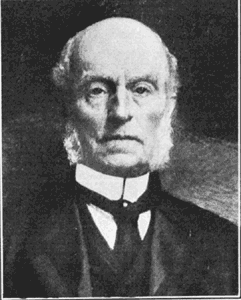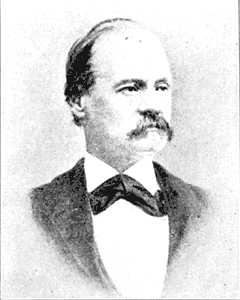| Home -> James H. Barry Press -> The Great Diamond Hoax - Chapter XVII | |||
|
Chapter XVII.
Sharon, Too, Becomes Associate of Famous Pioneer; This Chapter Tells How Great Panic Was Averted. Ralston Lays Foundation for Huge Fortune of D. O. Mills by Making Him a Bank President Ralston had two business associates - I might almost call them familiars - William Sharon and D. O. Mills. D. O. Mills was a man of some fortune, worth perhaps half a million dollars. He was about to leave for the East to settle down somewhere under his own vine and fig tree, when Ralston took him up. The latter was just organizing the Bank of California, had no ambition for titular dignities, and offered Mills the place of president. He promised that the job would be a sinecure - that he would do all the work. Mills accepted. That was the foundation of his huge fortune. But he was a mighty cautious speculator in those days. He tried his hand at a number of ventures, sometime invested large sums, but always required a guaranty against loss. Strangely enough, this used to be given him often, because of the conservatism associated with his name. That, however, did not last long. He became a bold, ambitious, original operator on his own account. He had fine personal habits, but was just the opposite of Ralston - unemotional, cool-headed and austere. Sharon was quite a different character. He was from the same part of the Northwest as J. D. Fry, an uncle of Mrs. Ralston, and so received a favorable introduction to the famous financier. Ralston sent Sharon to Virginia City during the early flush times as an agent for his mining interests, and when the Bank of California was organized and a branch located on the Comstock Lode, Sharon became manager, a position of great prominence and power. He was a daring, spectacular plunger, though a very shrewd one, made big money from the outset and with his general fore-knowledge of conditions really took no chance at all on great stock market deals. With unexampled rapidity, he accumulated a fortune of millions. Having no pet hobbies to interfere with accumulating money, before the '60s were over both Mills and Sharon probably possessed larger fortunes than their chief. As I have said Sharon's personality was very different from that of Mills in many ways. He had some habits that an anchorite might not approve. Among other things he was devoted to the great national pastime - draw-poker. Many legends of his prowess, of his bewildering bluffs and high-class technique were long fragrant memories of the Comstock Lode. It is related that a friend of Ralston with a moral turn warned him that his agent at Virginia was a notorious, abandoned and dissolute poker player. The banker listened with absorbed interest. "Does he win or lose?" he asked. "My information," said the informer, "is that he almost always wins." "Good," said Ralston. "He's the very man I want." The three were associated in many enterprises of the first magnitude. They had combined resources, speaking very conservatively, of not less than thirty-five millions, which is a big bunch of money even today. They formed an irresistible power in California, until the railroad dynasty succeeded them. Still I have reason to believe that Ralston never gave these associates his full confidence, and that the relation became irksome, if not oppressive. I judge the former from an unrecorded incident that ought to be remembered in financial history - an incident that just prevented a crisis far more terrible than that of 1907. It was in the year 1869. Ralston had loaned the railroad people some months before $3,000,000, with which they pushed their line to Ogden, adding a hundred miles to the Central Pacific in its cross-country race with the Union Pacific for mileage. This large sum had gone out of the State absolutely. Also two millions had taken wing for South America to finance an investment there. Things were already a trifle tight when in July, 1869, Jay Gould's famous "gold corner" raised the yellow metal to a huge premium and the gold coin of California was drained eastward, as through a sieve. The banks always carried a large amount of gold bars, but this was not available as coin, for the mint happened to be shut down pending a change of administration. The situation need not have been serious, for tucked away in the United States sub-treasury were $14,000,000 in gold coin. It seemed the most legitimate transaction in the world to deposit gold bars in the Treasury and carry away an equal value in coin. But President Grant, who was rather new on the job, for some unaccountable reason absolutely refused to sanction the transfer, although the bankers almost burned up the wires with their appeals. An uneasy feeling was over the town, the overcharged atmosphere of panic, apt to break loose at any moment into a resistless storm. While the tension was at its height I called at the Bank of California one afternoon and was ushered into the private office of Mr. Ralston. To tell the truth, I was feeling the pinch myself, and wanted to know something of the outlook. The banker said I was just the man he wanted to see. "If things go on as they are," he said, "every bank will be closed by tomorrow afternoon. Not one of us can stand a half day's run, and all will go down in a heap. Then look out for hell in general to break loose. This will happen if I don't get a million dollars in coin in the vaults tonight. But I intend to get it, and want you and Maurice Dore to help. Be at the bank at 1 o'clock tonight, and put on an old suit of clothes, for you will have plenty of hard work to do." Dore and myself met by appointment shortly after midnight. We were utterly mystified. Together we tramped through the deserted, dimly lighted streets. It seemed just like old times - the time we boarded the Chapman to become privateers. We found Ralston at the bank with one of its trusty officials, still alive and prominent in San Francisco. The financier was in high spirits, but counseled caution. We walked noiselessly to the United States Sub-Treasury, then located on Montgomery between Sacramento and California streets, where the Selby offices afterward stood. A dim light was burning within. Mr. Ralston asked its to halt a few paces from the entrance; then to our great surprise he opened the door of the Sub-Treasury, without challenge of any kind, and closed it after him as he stepped inside. Presently he emerged with several sacks of coin. "Take that to the bank," he said. "The gentleman there will give you something to bring back." The party at the bank received the cash, tallied it and handed its gold bars for the same value. These we took to the Sub-Treasury, where we found Mr. Ralston smilingly awaiting its with a new cargo of sacks on the sidewalk. We turned over the bars and made another journey to the bank. Thus, at dead of night, passing to and fro, we transferred in actual weight, between the Sub-Treasury and the bank nearly five tons of gold. We did not get quite as much as Ralston wanted, before the light began to break. It was a heart-breaking job from a physical standpoint. I was young and athletic and stood my end of it in good shape. But Maurice Dore was of sedentary habit, soft as mush, and he was on the verge of collapse. He was nearly chest foundered and had a swayback appearance for a month. During all this time, not a person passed to interrupt us. This was doubtless due to a prearrangement with the policeman on the beat. When the Bank of California opened the next morning a rather ominous looking crowd was in waiting. Lines began to form behind the paying tellers' windows. It wasn't a "run," but a "near-run." Ralston appeared on the scene and looked annoyed, as he said, "Why are you making so many of our customers wait on a busy day? Put more tellers on the windows and have your coin on hand." More tellers went to the windows. Porters brought tray after tray from the vaults. It was amazing how the crowd changed their minds about wanting their money and melted away. And all over the troubled city the report spread that the Bank of California had coin to burn, and the news caused a general relief. Nevertheless, a serious run started on one of the leading banks. Ralston hurried to the spot, mounted a dry goods box and addressed the crowd. He told them they were doing the bank and the city a great injustice. He declared that the bank was absolutely sound - which was the truth. He further told the crowd that they need not wait for a line-up. Just bring their books to the Bank of California and they would be accommodated with the cash there. Again, the crowd slunk away abashed. Thus a tremendous panic, the consequences of which might have been world-wide, was averted by a bold front, a nervy bluff backed by a million in cash. Three days later, President Grant reversed himself and allowed gold to be exchanged at the Sub-Treasury for cash, which settled all anxiety. This was brought about through the agency of Jesse Seligman, the New York banker, who gave the President a banquet and then showed him his mistake. But neither Mills nor Sharon, who were leading officers of the bank, ever knew how Ralston gathered in nearly a million dollars after banking hours that day. All the satisfaction they ever got was that a kind friend had come to the bank's assistance. |
|||
 D. O. Mills First President Bank of California, a financier of national repute. |
|||
 William Sharon A leading Comstock figure, former U. S. Senator. |
|||